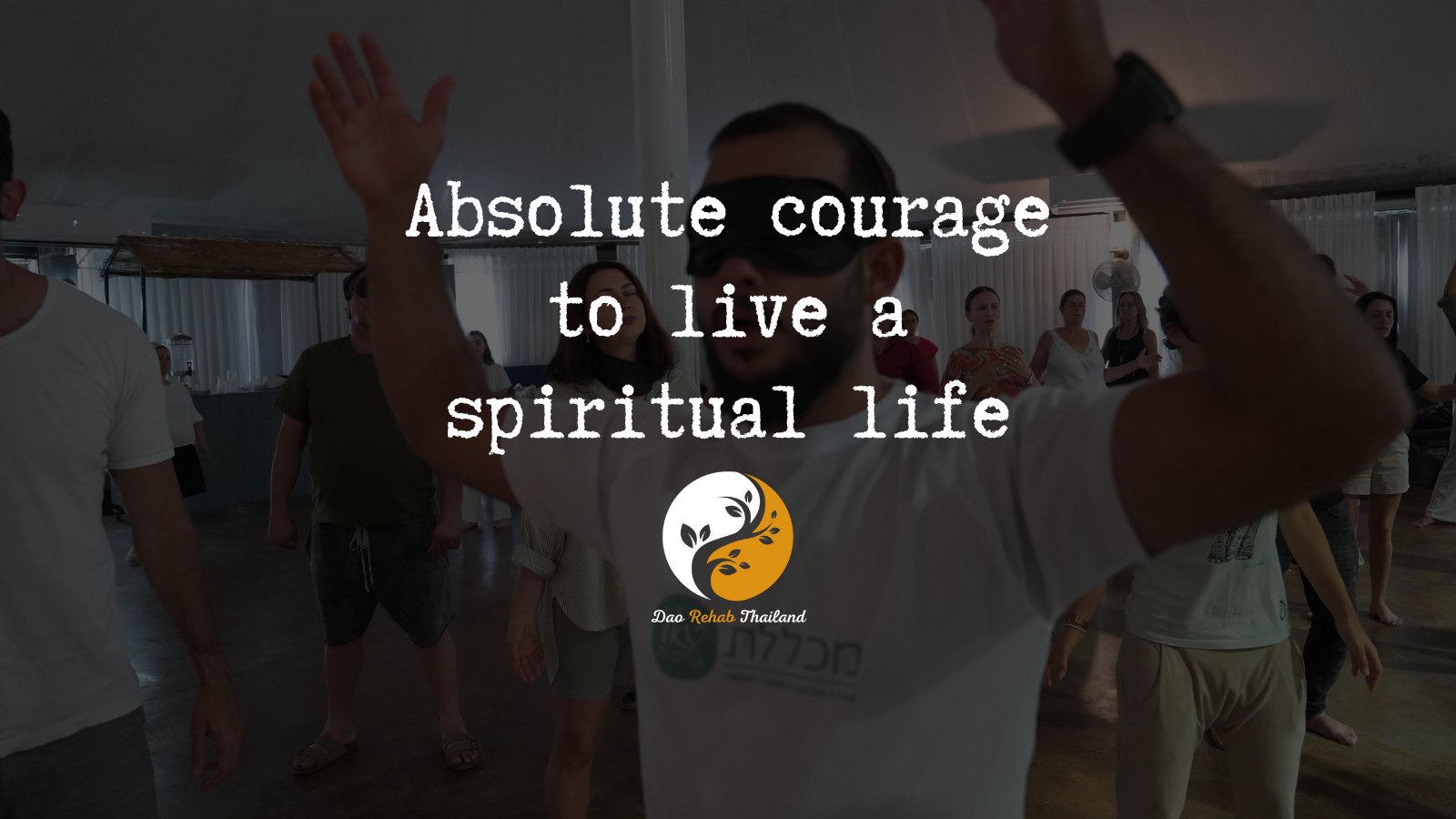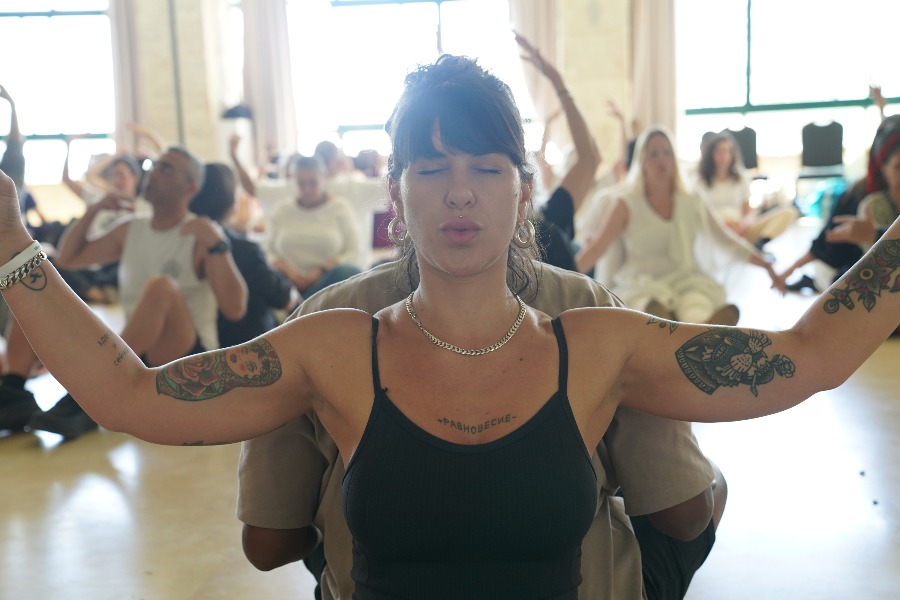
Absolute courage to live a spiritual life
Absolute courage to live a spiritual life
“Turning the impossible into possible”

"Detox from Drugs at a Luxury Holistic Center in Thailand and Israel"

Absolute courage to live a spiritual life
The main theme is the natural tendency of the human mind to create fixed ideas and resist change. When people approach a charismatic figure, they tend to form a fixed image of him, and miss his ever-changing true essence. The mind strives to live with fixed ideas because it fears the need to reorganize the inner being following any change.
"Holistic Center for Trauma, Addiction, and Mental Imbalance Treatment in Thailand"
“Come to the beginning of your journey to freedom from addiction to alcohol, drugs, and pills, and rediscover your life within the serene embrace of DaoTherapy Rehab in Thailand—where holistic healing meets empowering recovery.”
DaoTherapy Holistic Rehab
Key Elements of Drugs Detox:
Medical Supervision: Drugs detox must be conducted under medical supervision, as the body may experience withdrawal symptoms. These can include nausea, anxiety, muscle aches, and insomnia. A medical team will monitor and manage these symptoms to ensure the patient’s safety and comfort.
Holistic Therapies:
Holistic Therapies: Many detox programs incorporate holistic therapies such as mindfulness, yoga, and meditation to help individuals cope with stress and anxiety during the detox process. These therapies support the mind-body connection and contribute to overall recovery.
Tapering Process
Tapering Process: Drugs detox often involves a gradual tapering of the drug to reduce withdrawal severity. Doctors will slowly decrease the dosage over time to allow the body to adjust to lower levels of the substance.
Psychological Support:
Psychological Support: Like any addiction recovery process, detox from Drugs includes psychological support. This can involve counseling, therapy, or support groups to address the mental and emotional aspects of addiction.
Post-Detox Treatment:
Post-Detox Treatment: After completing detox, continuing treatment is crucial to prevent relapse. This often includes participation in ongoing therapy, group support, and the development of new coping strategies to maintain sobriety.
I personally am not interested in pictures
From my life experience on the spiritual path, it is not possible to meet the same person twice, or even once, because everything is in constant change. He himself is constantly changing, therefore those who are attached to him must be able to move with these changes, otherwise a conflict will arise between the fixed image and the dynamic reality. Many people who were close to me in my life ended up moving away from me because they stuck to their image of me instead of dealing with my constant change.
It illustrates the gap between image and reality through people who are constantly collecting photos from all kinds of periods of their lives. I personally do not show interest in the pictures, because they only represent what is dead, not what is alive. There is the story of Picasso refusing to sell his self-portrait, telling the woman who wanted to buy it that it wasn’t him, because if it was him, he would have kissed her.
Staying with people like me requires the greatest courage – the ability to see the change and move with me. It is not easy, because the mind prefers fixed ideas. A story about Mola Nasradin as a metaphor for the human tendency to seek consistency even at the cost of truth – Nasradin praises the same vegetable every day more and more, and when the king gets angry with him he agrees with him that the vegetable is bad, because he is a loyal servant of the king.
I want to emphasize that when you approach me there are only two options – give up the idea of consistency or give up on me. Humans are so in love with their ideas that they are able to leave me easily but not the fixed ideas. It challenges us to develop mental flexibility, courage to change and a willingness to let go of fixed images to experience the ever-changing present moment. This is the only way to stay in real contact with ourselves, with those around us and with life itself.

contact us
Contact us with your questions
We would love to speak with you! Feel free to reach out with any questions.

get in touch
Schedule a free consultation
Schedule a free consultation with our team and let’s make things happen!
Constant change versus fixed ideas
The main theme of my life today is the tension that exists between the natural tendency of the human mind to create fixed ideas and the dynamic and frequently changing reality. We all know the feeling of holding on to familiar concepts and images, even when they no longer correspond to the current situation. We cling to fixed concepts because they provide us with a sense of security and stability, but in doing so we limit ourselves and prevent ourselves from experiencing the richness and depth of the moment.
The meeting with an inspiring figure
When people meet complex characters who live spiritually, they often form a fixed image of them. They fall in love with their idea of that person, and begin to treat the idea as reality itself. But in doing so they miss who that person really is, because in his essence he is always in motion and changing. It is as if they are trying to catch the flowing water with their hands – as soon as they close their fists, the water already flows out and disappears.
The fear of changes and the need for reorganization
The human brain has difficulty coping with changes, because they require it to reorganize the entire internal system. Every time something changes, we have to find a new way to adapt to the situation, and this can be tiring and challenging. Therefore, it is easier for us to simply stick to familiar ideas and ignore the transformations happening around us. We prefer to live in a bubble of simulated stability, even if it does not faithfully reflect the complexity of life.
Everything flows – the worldview of Heraclitus
For many years I support the approach of the ancient Greek philosopher Heraclitus, who claims that you cannot step into the same river twice. That is, everything is in constant change, and the next moment is never the same as the previous one. Osho even goes further, saying that one cannot enter the same river even once. As soon as we put our foot in the water, they are already different. And when we meet a person, he is already different from what he was a second ago. We ourselves are also changing at any given moment.
The gap between an image and a living reality
For me, the photos only record dead and frozen moments, and not who I am in the present, here and now.
The courage to change and develop
Being in a real relationship with a person like me takes a lot of courage. It is the courage to recognize that everything changes, and to be ready to move with the change. It’s not always comfortable or easy, but it’s the only way to live an authentic life. If we try to stick to outdated and fixed ideas, we will find ourselves in a constant struggle with reality. Only when we are open and ready to develop ourselves, will we be able to form a deep connection with those around us and get the best out of every experience.
Choosing fixed ideas over dynamic reality
Clinging to fixed ideas can lead us to absurd and even destructive situations. When we insist on seeing reality only through the prism of our perceptions, we may lose touch with what is really happening. People who got close to me and developed a certain image about me, often had a hard time accommodating the changes that took place in him and in my studies over time. They stuck to the idea they created about who I am, and when I no longer fit that idea, they preferred to distance themselves from me and even become my enemies full of anger and rage, instead of updating their perceptions. They chose the comfort of the known and the known over the challenge of dealing with the unexpected.
accept the impermanence of life
In the end, the great lesson of my life is an invitation to recognize that everything is fleeting and ephemeral. There is no point in investing energy in trying to preserve fixed images and ideas, because they will inevitably change. Instead, we can develop an awareness of the constant processes of becoming and becoming, and become friends with the knowledge that we are always in motion. The more we accept the fact that life is a constant stream of changes, the more we can relax into the present being and appreciate each new moment as a precious gift.
Cultivating flexibility and openness to change
To live in harmony with the dynamic nature of reality, we need to cultivate mental and emotional flexibility within ourselves. We must be attentive to the signals that indicate that it is time to change and develop, and face the fear of the unknown. When we allow ourselves to be vulnerable and relinquish control, we open ourselves up to surprises and refreshing discoveries. Every time we are willing to step out of our comfort zone and explore new possibilities, we expand our range of experiences and enrich our inner world.
The way to a real connection with ourselves and those around us
In the end, clinging to fixed ideas prevents us from making direct contact with ourselves, with those around us, and with life itself. When we are fixed in our images and expectations, we experience reality in a filtered and distant way. But when we let go of the need to define and control, and simply allow ourselves to experience each moment as it is – in all its complexity and richness – we can discover the wonder that lies in human existence. It is an invitation to live in wonder and appreciation, and to see the magic that is revealed in every new encounter with ourselves and the world.
Central insights of Osho:
1. The mind has a natural tendency to develop fixed ideas quickly.
2. It is impossible to meet the same person twice, because the person and the whole world are constantly changing.
3. When people approach me they develop a fixed idea about me, and miss who I really am.
4. A picture can only represent what is dead, not what is alive.
5. Being with me requires courage, and the greatest courage is the ability to see my change and move with it.
6. People are comfortable with consistency, but I’m inconsistent so it’s hard for them to stay with me.
7. People are so in love with their ideas, they can leave me but not their ideas.
8. Mulla Nasreddin demonstrates how a loyal servant always agrees with his king, even when he contradicts himself.
9. When you approach a person like me, you either have to give up the idea of consistency or give up on me.
10. People can leave their quirks, but not their fixed ideas.
Osho's practical advice:
1. Be aware of the mind’s natural tendency to form fixed ideas quickly.
2. Remember that everything changes all the time, both the people you meet and yourself.
3. When approaching someone, be careful of creating a fixed idea about them that misses who they really are.
4. Know that a picture can only represent something dead, not what lives and changes.
5. Develop courage to stay with changes and move with them, especially when it comes to humans like me.
6. Notice if you prefer to stick to your ideas more than to remain open to the changing reality.
Psychological Support:
Psychological Support: Like any addiction recovery process, detox from Subutex includes psychological support. This can involve counseling, therapy, or support groups to address the mental and emotional aspects of addiction.
Osho's self-talk mantras:
1. Instead of “I always stick to fixed ideas”, say: “I am open to seeing the changing reality”.
2. Instead of “I’m afraid of changes”, say: “I have the courage to face changes”.
3. Instead of “I lose the real connection with people”, say: “I am able to see people as they really are, beyond my ideas”.
4. Instead of “I stay stuck in my patterns and expectations”, say: “I allow myself and others to change and grow”.
5. Instead of “I give up on relationships when they don’t line up with my ideas”, say: “I choose the real and live relationship, even when it challenges me”.
Thought provoking questions:
1. Today, when you meet a familiar person, try to observe him with fresh eyes, without your fixed ideas about him. What do you discover?
2. Before any significant interaction, stop for a moment and remind yourself: “Everything changes all the time, including the person in front of me and including me.” How does this affect the interaction?
3. Choose a picture of yourself that you like, and look at it. Be aware of the gap between the image and you as you are now, living and breathing. What do you learn from this?
4. When you feel that your opinion is clashing with someone, check whether you stick to your idea or are open to seeing their point of view. Practice mental flexibility.
5. At the end of each day, ask yourself: “Where today was I brave enough to move with the changes? And where did I cling to the thorns of my ideas?” Recognize yourself for the courage, and learn from the mistakes.








